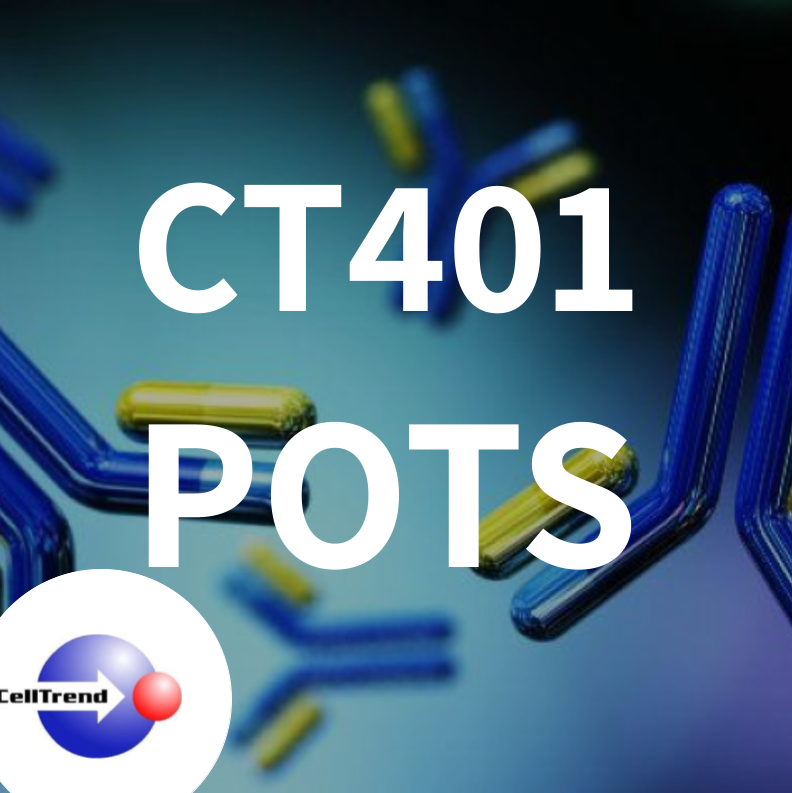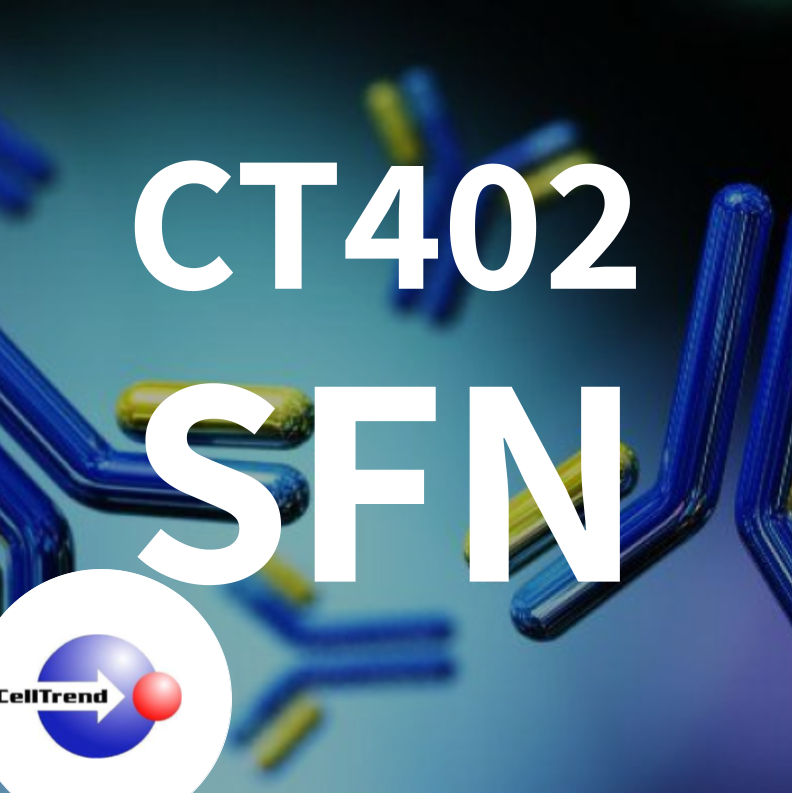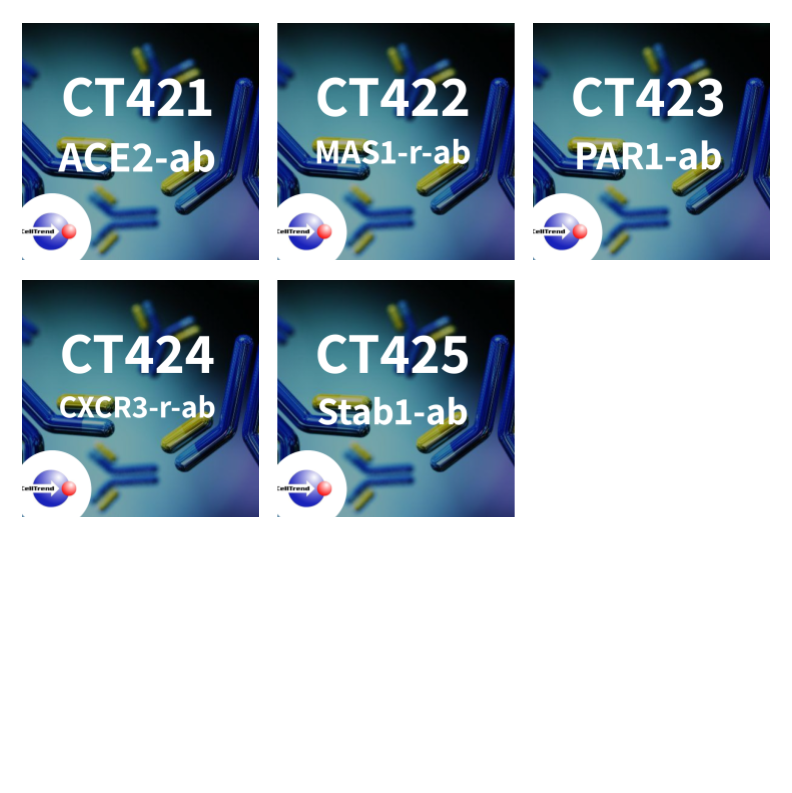
Autoimmune antibodies in M.E., POTS, SFN, and Long COVID
The laboratory CellTrend, together with Professor Carmen Scheibenbogen from The University Hospital Charité in Berlin, have developed immunoassays able to indicate physiological markers for:
- Myalgic Encephalomyelitis (M.E.);
- Postural Orthostatic Tachycardia Syndrome (POTS);
- Small Fibre Neuropathy (SFN);
- and Long COVID.
AONM is delighted to represent this renowned laboratory in the UK, and describes the individual panels in the sections below.
Autoantibodies associated with M.E.
The autonomic nervous system (ANS) regulates vital functions like heart rate, digestion, and blood flow through neurotransmitters—primarily noradrenaline and acetylcholine. These chemicals transmit signals by binding to adrenergic and muscarinic acetylcholine receptors (ß-AdR and mAChR).
Research shows that receptor function is impaired in many M.E. patients due to the presence of autoantibodies—antibodies that mistakenly target the body’s own receptors.
Key findings include:
Reduced muscarinic receptor function: Studies have shown that acetylcholine-induced blood flow responses last longer in M.E. patients (Spence et al., 2004), and PET scans have revealed reduced neurotransmitter binding in patients with high m1-AChR autoantibody levels (Yamamoto et al., 2012).
Immune system disruption: Adrenergic receptors are also found on immune cells. In M.E., ß2-AdR autoantibodies appear to alter monocyte cytokine production (Kavelaars et al., 2000; Hartwig et al., 2020).
Cardiovascular dysfunction: Professor Scheibenbogen’s research highlights a strong link between ß2-AdR autoantibodies and blood flow regulation in M.E. patients. Her team found that these autoantibodies, along with elevated M3 and M4 receptor antibodies, may contribute to symptoms like reduced blood volume, intracranial hypertension, small fiber neuropathy, and sleep disturbances.
These findings are summarised in key studies, including the article “Antibodies to β adrenergic and muscarinic cholinergic receptors in patients with Chronic Fatigue Syndrome“ (published in Brain, Behavior and Immunity).
The M.E. Autoantibody Panel includes:
- Beta-1 adrenergic receptor autoantibodies
- Beta-2 adrenergic receptor autoantibodies
- Muscarinic M3 acetylcholine receptor autoantibodies
- Muscarinic M4 acetylcholine receptor autoantibodies
Postural Orthostatic Tachycardia Syndrome (POTS) Panel
CellTrend offers a specialised antibody panel for patients with POTS. In addition to the markers included in the M.E. diagnostics panel (see above), the POTS Panel also measures antibodies against several muscarinic acetylcholine receptors (M1, M2, M5), as well as alpha-1 and alpha-2 adrenergic receptors.
Research led by Prof. Dr. Kem (University of Oklahoma Health Sciences Center and VA Medical Center) was the first to identify Angiotensin II Type 1 Receptor (AT1R) autoantibodies in POTS patients. Based on these findings, the CellTrend POTS Panel has been expanded to include AT1R antibody testing.
The POTS Panel includes 11 markers in total:
- AT1R (Angiotensin II receptor 1) IgG autoantibodies
- ETAR (Endothelin receptor A) IgG autoantibodies
- Beta-1 adrenergic receptor autoantibodies
- Beta-2 adrenergic receptor autoantibodies
- Muscarinic acetylcholine receptor autoantibodies: M1, M2, M3, M4, M5
- Alpha-1 adrenergic receptor autoantibodies
- Alpha-2 adrenergic receptor autoantibodies
[i] Yu X, Li H, Murphy TA, Nuss Z, Liles J, Liles C, Aston CE, Raj SR, Fedorowski A, Kem DC. Angiotensin II Type 1 Receptor Autoantibodies in Postural Tachycardia Syndrome. J Am Heart Assoc. 2018 Apr 4;7(8):e008351.
Small Fibre Neuropathy (SFN) Panel
Small fibre neuropathy (SFN) is a type of neuropathy affecting small, unmyelinated or thinly myelinated sensory nerves. It can arise from immune, metabolic, toxic, hereditary, or genetic causes. SFN is commonly associated with conditions such as Sjögren’s Syndrome, Celiac disease, Lupus, Rheumatoid Arthritis (RA), Type 1 Diabetes, IBD, Sarcoidosis, Paraneoplastic syndromes, and possibly Hashimoto’s Thyroiditis.
Symptoms may involve sensory disturbances, autonomic dysfunction, or both.
Elevated levels of two autoantibodies—FGFR3-IgG and TSHDS-IgM—have been found in SFN patients. A clinical trial is currently evaluating the effectiveness of IVIG treatment in individuals positive for these antibodies.
Key markers in the SFN Autoantibody Panel:
- FGFR-3 Auto-Antibodies
- TSHDS Auto-Antibodies
[i] Nagarajan E, Kang SA, Holmes C, Govindarajan R. Clinical features with anti fibroblast growth factor receptor 3 (FGFR3) antibody-related polyneuropathy: a retrospective study. BMC Neurol. 2021 Feb 15;21(1):74.
[ii] Kovvuru S, Cardenas YC, Huttner A, Nowak RJ, Roy B. Clinical characteristics of fibroblast growth factor receptor 3 antibody-related polyneuropathy: a retrospective study. Eur J Neurol. 2020 Jul;27(7):1310-1318.
[iii] Nissan J, Blokh A, Ben-Shabat N, Heidecke H, Halpert G, Shoenfeld Y, Amital H. Possible Association Between Anti-Trisulfated-Heparin-Disaccharide (TS-HDS) Immunoglobulin M Autoantibody and Fibromyalgia Syndrome. Isr Med Assoc J. 2023 Mar;25(3):187-190. PMID: 36946662.
[iv] Malik A, Lopate G, Hayat G, Jones J, Atluri R, Malo B, Pestronk A. Prevalence of Axonal Sensory Neuropathy With IgM Binding to Trisulfated Heparin Disaccharide in Patients With Fibromyalgia. J Clin Neuromuscul Dis. 2019 Mar;20(3):103-110.
Long COVID autoantibodies
Long COVID is characterised by so many diverse symptoms that health professionals will wish to make their own decisions on which of the autoimmune markers to include for their patients. However, additional markers have been suggested by CellTrend due to the latest science accumulating around the following autoantibodies (the references will be supplied with explanations shortly):
Additional markers suggested for Long COVID:
ACE2 antibodies
MASR antibodies
PAR1 antibodies
STABILIN-1 antibodies
CXCR3 antibodies




